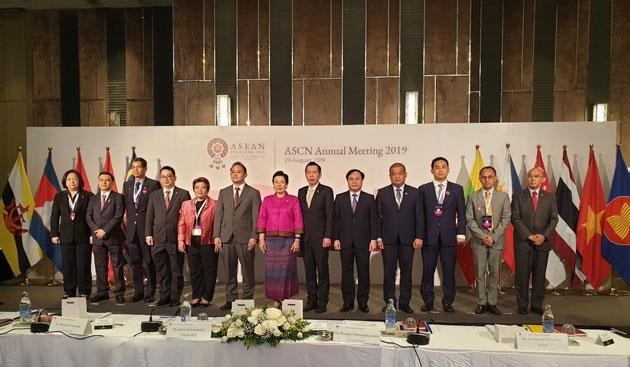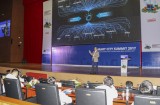ASEAN Smart Cities Network 2019 conference held in Bangkok
The ASEAN Smart Cities Network (ASCN) convened its 2019 conference in Bangkok, Thailand from August 22 – 24 with the aim of developing smart cities and setting standards for building smart urban areas in Southeast Asia.

At the event (Photo: nhandan)
According to the National News Bureau of Thailand, Thai Foreign Minister Don Pramudwinai attended the opening ceremony on August 23 and delivered a special speech on becoming a network partner for sustainability.
He said ASEAN is now guiding 26 cities under the ASCN into becoming smart cities, which will create sustainability, economic and social opportunities and investment.
Thailand has three smart cities, namely Phuket, Sriracha and Bangkok, and is in the process of developing other areas into smart cities.
This year, ASEAN received cooperation from the G20 countries in sharing information, transferring technology to solve smart city problems and disseminating various case studies on becoming a smart city by following a sustainable pattern.
Held for the second time, the event included a closed meeting of 26 pilot smart cities to determine the framework, before summarising all plans and submitting them to the 35th ASEAN Summit scheduled for November 2019.
A smart city exhibition by entrepreneurs, government and private agencies worldwide, was also held.
Currently, the ASCN consists of 26 cities in ASEAN member countries, namely Bandar Seri Begawan, Bangkok, Chonburi, Phuket, Banyuwangi, Battambang, Cebu, Danang, Davao, Jakarta, Hanoi, Ho Chi Minh, Johor Bahru, Kota Kinabalu, Kuala Lumpur, Kucing, Luang Prabang, Makassar, Mandalay, Manila, Naypyidaw, Phnom Penh, Siem Reap, Singapore, Vientiane and Yangon.
All 26 cities have great potential for development, especially in terms of infrastructure, data connection, digital technology and culture.
VNA
 Binh An Ward launches "Digital Family" program
Binh An Ward launches "Digital Family" program
 Bau Bang launches the Intelligent Monitoring and Operation Center (IOC)
Bau Bang launches the Intelligent Monitoring and Operation Center (IOC)
 Vibrant activities from grassroots level
Vibrant activities from grassroots level
Binh Duong is an active and responsible member of ICF
 Binh Duong aims at building a smart, green and sustainable city
Binh Duong aims at building a smart, green and sustainable city
 Building up an innovation ecosystem at new era’s demands
Building up an innovation ecosystem at new era’s demands
 Abundant activities in response to National Digital Transformation Day
Abundant activities in response to National Digital Transformation Day
 Beca Smart City - The foundation of a Smart City
Beca Smart City - The foundation of a Smart City
 Digital transformation supports social welfare
Digital transformation supports social welfare
 PM requires full legal corridor to promote national digital transformation
PM requires full legal corridor to promote national digital transformation



